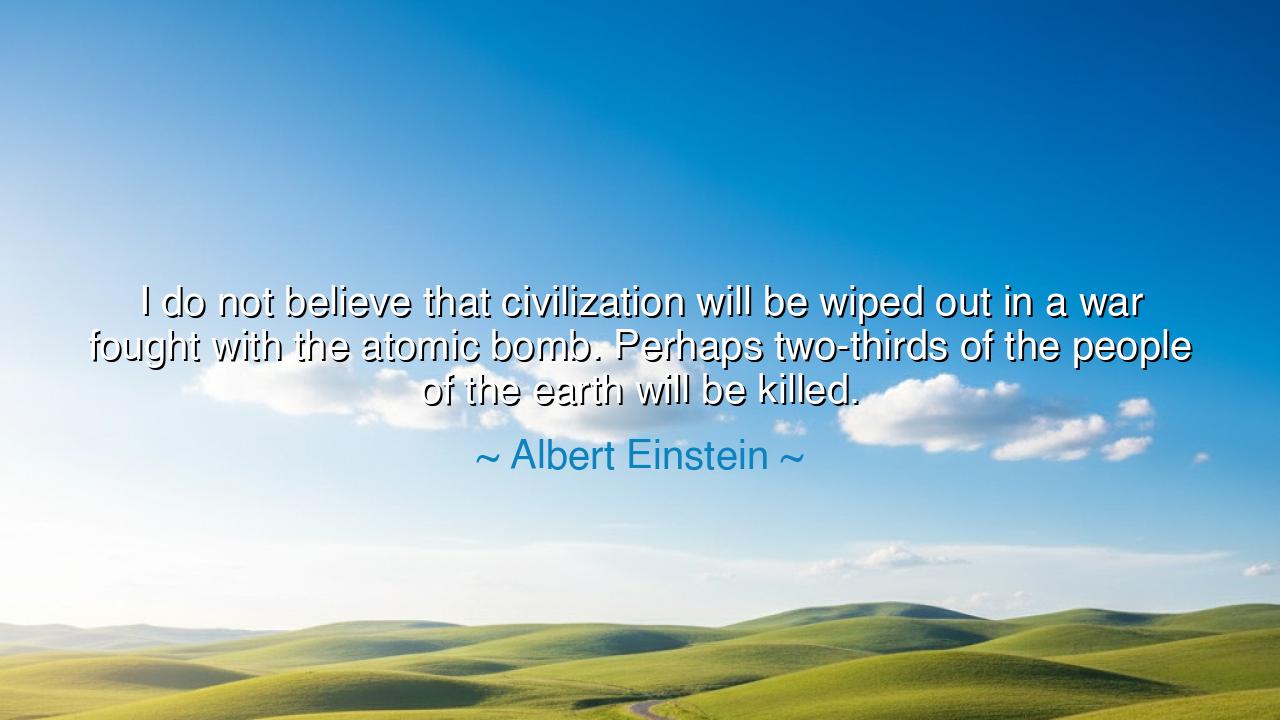
I do not believe that civilization will be wiped out in a war
I do not believe that civilization will be wiped out in a war fought with the atomic bomb. Perhaps two-thirds of the people of the earth will be killed.






Hear now, O children of the earth, for the words of Albert Einstein echo like a warning bell through the corridors of time. He spoke—"I do not believe that civilization will be wiped out in a war fought with the atomic bomb. Perhaps two-thirds of the people of the earth will be killed." These words, though spoken in the shadow of the greatest conflict the world had known, carry within them a prophecy, a sobering truth about the fragile nature of civilization and the unprecedented power unleashed by humanity's pursuit of mastery over nature.
Einstein, a man of unparalleled intellect, was no stranger to the complexities of human ambition. The atomic bomb, a creation of mankind’s desire to control the very forces of nature, was a paradox—a tool of destruction that could annihilate entire cities in an instant, yet was born from the minds of the most brilliant thinkers of the age. In Einstein’s words lies a cautionary tale, a reminder that the very power that elevates us as a species also has the potential to undo us. This paradox of progress is not new; it has always been with us, as the great mythologies of old remind us of the double-edged sword of knowledge and power.
In the ancient stories, we hear of Prometheus, the titan who stole fire from the gods and gave it to mankind. He bestowed upon us the gift of fire, a force of creation, of warmth and light. Yet, with this gift came great consequence. Fire could cook food, but it could also burn cities to the ground. Prometheus’s tale warns us that the very powers we wield in the pursuit of progress can also lead to our destruction. Just as fire, in the wrong hands, can destroy, so too can the power of the atomic bomb, which was born from the minds of scientists, but carries within it the potential to erase all that we have built.
Consider the history of the two world wars, which marked the darkest chapters of human history. In the aftermath of the First World War, the world witnessed the devastation of nations, the suffering of millions, and the loss of countless lives. Yet, even in the midst of this darkness, civilization found a way to rebuild, to rise from the ashes and rebuild nations, economies, and lives. But the atomic bomb, unleashed upon the cities of Hiroshima and Nagasaki, brought a new level of destruction, one that could not be easily undone. Einstein, who had been part of the scientific community that helped bring the bomb into existence, understood the implications of this new weapon: it had the power to change the very fabric of civilization, to erase it in an instant.
But Einstein’s words also contain a glimmer of hope—for he does not say that civilization will be wiped out. He speaks of the possibility of survival, even after two-thirds of the world is lost. This speaks to the resilience of the human spirit, the ability of mankind to endure and rebuild, even in the face of unimaginable loss. The survival of civilization is not assured, but it is possible. It is the strength of our will, our capacity to rise after each fall, that will determine our future. It is not the weapons we wield that define us, but the wisdom with which we use them.
Let us remember the story of the phoenix, that mythical bird that rises from its own ashes. After destruction comes rebirth, and this truth remains as steadfast as the passage of time. Even if humanity faces the consequences of its own creations, the capacity for renewal and growth lies within us. The greatest empires were not built on perfection, but on resilience—on the willingness to rebuild after destruction, to learn from past mistakes, and to use our knowledge and power wisely.
So, O children of the earth, take heed of Einstein’s warning, for it is not merely a prophecy but a call to action. The future of civilization lies not only in the hands of our scientists and leaders but in the hands of each one of us. We must be stewards of the knowledge we wield, recognizing the power and the responsibility that comes with it. Let us choose the path of wisdom, of humility, and of resilience. The future is not yet written, and the empire of humanity can still be built, but only if we learn to balance our desires for power with the wisdom to use it for the good of all. Let us rise, as the phoenix, and forge a future where knowledge is wielded with the highest regard for life, for peace, and for the preservation of all that is good in the world.






AAdministratorAdministrator
Welcome, honored guests. Please leave a comment, we will respond soon